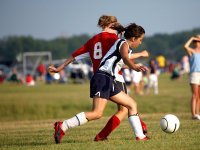4 Ways to Use Athletics to Promote SEL and Character Development
Check out these four ways that athletic experiences promote social and emotional learning and character development.
Your content has been saved!
Go to My Saved Content.Educational Athletics is a term used by the Massachusetts Interscholastic Athletic Association (MIAA) to denote how athletic competition should be both an extension of the classroom and an educational activity in itself designed to teach life lessons and prepare young people with both values and skills they need for the future.
If this sounds quite compatible with social-emotional and character development, it should, because it is! The key point is to design athletic experiences specifically to promote those skills and values. Let's take a closer look at four ways this can happen in both school-connected and out-of-school athletics, including physical education classes.
1. Build Skills
Individually, students benefit from emotional regulation skills. It allows them to calm down their breathing and keep focus on pressure situations, such as at-bats, free throws, and end-of-game situations. Problem solving and decision making are valuable skills when analyzing one's own performance and looking to make improvements. Empathy and communication are skills essential for knowing what is happening with teammates and coordinating activities, whether playing doubles tennis, rowing, or on the football field.
2. Promote Essential Virtues
Both individually and as teams, youth have many opportunities to overcome adversity through persistence. Teams are rarely uniformly successful. Sports like baseball involve more individual and collective "outs" than "hits." Soccer teams that fall behind by two goals cannot afford to panic. It is rare to find a successful team where at least one person does not step up to provide leadership. And sportsmanship is actually a set of virtues, including integrity, consideration for others, and humility.
3. Use Skills to Give Back
Athletes not only represent their teams, but also their schools, sponsoring organizations, and communities. Those who have athletic gifts and who have been fortunate enough to benefit from coaching should have an obligation to share their skills and knowledge with others. That means working with younger students, Special Olympics athletes, those with physical handicaps, and others who may live in disadvantaged areas where they don't have access to facilities and coaching.
Ray Pasi, in his book, Higher Expectations: Promoting Social Emotional Learning and Academic Achievement in Your School, tells how he has intra or extra-mural athletes in his schools create contracts, where they set and are held accountable to three goals in each of three areas: how will they make themselves better, how will they make their team better, and how will they make their school or community better.
4. Build the Capacity of Coaches
Of course, for the above to happen, coaches (and physical education teachers) must have opportunities to learn and share ideas about how to build skills, virtues, and generosity in an athletic context. The MIAA has done an exemplary job creating these opportunities with such events as Coaches Education Clinics, Captains/Coaches Workshops, Leadership Training Institute, Sportsmanship Summit, Anti-Defamation League Respect Workshop, Wellness Summit, Student Leadership Conference, and more.
According to William Gaine, Jr., Executive Director of the MIAA, it's difficult to imagine healthy athletic competition without seeing it as a vehicle for building youth social-emotional competencies. As we know to a greater and greater extent today, athletes cannot be better than their character, and who they are as people will continue beyond their time in athletic competition.
